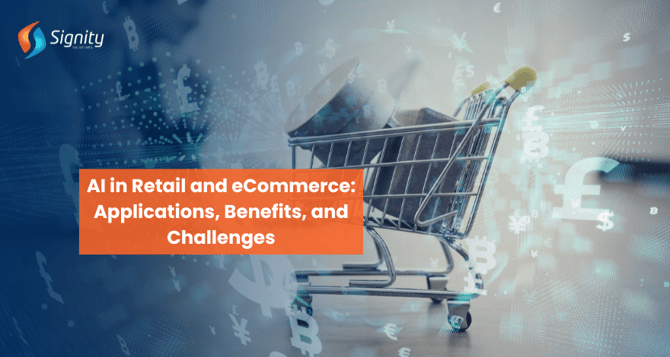AI in Retail and eCommerce: Applications, Benefits, and Challenges
For businesses in the retail and eCommerce industry, it is crucial to adapt the latest AI solutions for better automation and growth. This blog will help you explore the applications, use cases, benefits, challenges, and future.

The retail and eCommerce industry continues to face several challenges in meeting customer expectations, managing the latest market demands, and staying competitive. With the increasing number of buyers, these challenges are sure to increase for businesses that work in traditional ways.
On the other hand, companies that integrate the best AI in retail have already started to tackle such problems. From managing inventory to instant response to customers, dynamic pricing, and more, AI in retail and eCommerce services is in demand.
This blog will help you explore the applications, AI use cases in retail, benefits, challenges, and future.
Key Takeaways
- AI in retail enhances personalization, streamlines operations, and addresses key retail challenges.
- AI applications like predictive analytics and virtual try-ons improve customer experiences and boost sales.
- Data privacy, integration, and skill gaps remain hurdles for AI adoption in retail and eCommerce.
- Generative AI, computer vision, and sustainability-focused solutions lead the way.
AI Applications in Retail and eCommerce
AI is unlocking new possibilities in retail and eCommerce by enabling data-driven decisions and personalized interactions. Some of the AI applications in retail and eCommerce include:

-
Personalized Product Recommendations
AI in retail and eCommerce also leverages machine learning algorithms to analyze customer preferences and browsing history. It helps deliver tailored product suggestions, further boosting conversion rates.
It also helps enhance user satisfaction by making their shopping experience quicker and more relevant.
-
Customer Segmentation and Lifetime Value Prediction
Another application of AI in the retail industry is that it uses AI-powered analytics to segment customers based on their behavior to predict lifetime value. It identifies high-value customers to help businesses prioritize retention efforts and loyalty programs.
Further, detailed segmentation allows for hyper-personalized campaigns to improve the overall marketing ROI.
-
AI Chatbots for Enhanced Customer Support
One of the applications of AI in retail and eCommerce is the AI chatbots. These AI-powered chatbots streamline customer interactions by handling queries and providing product information to assist with order tracking in real-time.
AI is expected to handle 80% of all customer interactions by 2030. Chatbots are also available 24/7 to offer instant assistance to customers in order to reduce response time. They can be easily integrated with CRM systems to personalize interactions and maintain customer history.
-
Visual Search Technology and Contextual Search
Artificial Intelligence retail enables businesses to enhance users’ shopping experience with visual search technology to help customers find products using images. Visual search also simplifies product discovery by bridging the gap between online and offline shopping.
Moreover, contextual search helps eliminate irrelevant results to guarantee buyers quickly find exactly what they need.
-
Generative AI for Content Creation
The AI technology enables retail and eCommerce companies to automate the creation of product descriptions, ad copy, and promotional materials to improve efficiency and consistency.
For instance, generative AI enables faster product launches by reducing the time spent on manual content creation. Businesses can ensure that content remains engaging and aligned with their brand voice with AI in retail.
-
Fraud Detection and Prevention
Fraud is one of the major concerns in the retail and eCommerce industry. Deploying advanced AI systems helps identify and prevent fraudulent activities like payment fraud or account takeovers to ensure secure transactions.
Artificial Intelligence continuously monitors transactions for suspicious patterns to provide real-time alerts. It builds customer trust by maintaining a safe and secure shopping environment.
-
Virtual Try-On Experiences
Businesses in the retail and eCommerce industries can use augmented reality and AI to enable customers to visualize how products like clothing or accessories will look.
Virtual try-ons reduce return rates by helping buyers make confident purchasing decisions. They also help provide an engaging and interactive shopping experience to increase customer retention.
-
Sales Forecasting
Lastly, AI for retail and eCommerce predicts future sales trends by using AI-powered analytics to help brands manage inventory and align marketing efforts. Sales forecasting further helps minimize overstocking or understocking issues.
These factors help optimize inventory costs and enable businesses to anticipate peak seasons and plan promotional campaigns accordingly.
How Businesses Use AI for Retail and eCommerce
The AI use cases in retail and eCommerce are wide. As seen in the image below, companies use Artificial Intelligence for various purposes:

-
AI Chatbots
AI chatbots provide instant, round-the-clock support by answering customer queries, assisting with orders, and guiding users through the purchasing process. This seamless interaction boosts customer satisfaction and drives higher conversion rates.
-
Recommendations and Customer Loyalty Programs
By leveraging predictive analytics, AI analyzes customer preferences to offer tailored product recommendations. These insights can also fuel effective customer loyalty programs, encouraging repeat purchases and fostering long-term engagement.
-
Inventory Management and Demand Forecasting
AI-powered demand forecasting helps retailers predict market trends and optimize stock levels. Combined with smart inventory management, it minimizes overstocking and stockouts, improving operational efficiency.
-
Dynamic Pricing and Assortment Optimization
Retailers can use AI for dynamic pricing, adjusting prices in real-time based on market demand, competitor pricing, and inventory levels. Assortment optimization ensures the right mix of products is available to meet customer needs.
-
Virtual Try-On and Visual Product Search
AI-driven virtual try-on solutions enable customers to see how products like clothing or makeup will look on them before purchasing. Similarly, visual product search simplifies finding items by allowing users to upload images instead of typing search terms.
-
Computer Vision and Voice Commerce
Computer vision enables retailers to enhance in-store experiences with smart shelves and cashier-less checkouts. In e-commerce, voice commerce allows customers to search and shop hands-free, offering convenience and accessibility.
Benefits of AI in Retail and eCommerce
AI in the retail and eCommerce industry brings several advantages for businesses to help connect with customers and personalize services. Some of the benefits include:

-
Enhanced Cross-Selling
AI-driven cross-selling increases average order value and sales by analyzing customer behavior and making recommendations for comparable products using predictive analytics.
-
Improved Customer Support
AI-powered chatbots and conversational AI give immediate support, manage several inquiries at once, and provide tailored answers, increasing client happiness and loyalty.
-
Tailored Shopping Experiences
By examining browsing and purchase history, AI makes it possible to provide personalized product recommendations, increasing conversion rates and guaranteeing that customers locate items they are more inclined to purchase.
“For instance, Vice President-Machine Learning, Amazon talks about the role of ML and AI plays in the growth of Amazon."
Video
-
Streamlined Shopping
While AI-powered site search provides precise, context-aware results, streamlining the shopping experience and increasing engagement, visual search enables shoppers to locate products using photos.
-
Optimized Inventory
AI-powered inventory control reduces overstocking and stockouts by guaranteeing ideal stock levels. Simultaneously, fraud prevention driven by AI identifies questionable transactions instantly, preserving consumer confidence.
-
Higher Revenue
AI makes it possible for dynamic pricing and promotions, which maximize profitability by modifying offerings and prices in response to consumer preferences, competitive analysis, and demand.
-
Stronger Customer Loyalty
Retailers can better comprehend and respond to client feedback by using customer sentiment analysis. When paired with AI-powered loyalty programs, companies may design customized incentives that encourage recurring business and sustained client involvement.
Automate Your Business to Eliminate Errors and Risks
Seamlessly integrate AI in retail and eCommerce to reduce the risk of mistakes and enhance productivity.
Challenges of Implementing AI in Retail and eCommerce
Even though AI plays a crucial role in the retail and eCommerce industry, this technology comes with several challenges that can be tough for businesses to handle.

-
Data Privacy and Security Risks
As AI systems frequently need access to sensitive customer data, ensuring data privacy and security is a significant concern. Large-scale data management also raises ethical and security issues.
-
Poor Quality or Insufficient Data
AI systems are highly dependent on precise and thorough data. The efficacy of AI-powered solutions can be diminished by errors, inefficiencies, and erroneous outputs caused by inadequate or poor-quality data.
-
Integration with Existing Systems
It is frequently difficult to integrate eCommerce systems and other current technology seamlessly, necessitating a high level of technical competence. Deployment delays may result from businesses' difficulties integrating with current systems.
-
Lack of AI Skills and Knowledge
Effective implementation and management of AI systems are hampered by staff members' lack of AI expertise. This difficulty is especially noticeable for businesses making the shift to AI-powered operations.
-
Potential Biases in Algorithms and Transparency Issues
Potential biases in AI systems could produce unfair results in areas like suggestions or pricing. Additionally, to keep customers' trust, AI-powered recommendations must be transparent.
-
Manual Processes and Inefficient Staff Scheduling
It can be challenging to switch from traditional processes and manual sales transactions to AI-driven automation. Additionally, if AI adoption isn't in line with workforce planning, ineffective staff scheduling can continue.
Future Trends of AI in Retail and eCommerce
Conversational AI for tailored consumer interactions, generative AI for content production, and big data analytics for more profound insights are all part of the future of AI in retail and eCommerce. Demand forecasting and dynamic pricing optimize operations, while computer vision and virtual try-ons will improve shopping.
AI will also power sustainability programs, warehouse automation, and fraud detection, creating a more intelligent and effective sector.
Grow Your Business With Top AI Solutions for Retail and eCommerce
Signity is a leading provider of AI in retail and eCommerce services. Our experienced professionals help brands get custom solutions to meet their specific needs. Get in touch with our experts today to build AI-powered solutions that bring the best results.
Frequently Asked Questions
Have a question in mind? We are here to answer. If you don’t see your question here, drop us a line at our contact page.
How is AI used in retail and eCommerce?
![]()
AI is used in retail and eCommerce to enhance operational efficiencies, personalize customer experiences, optimize inventory management, and drive sales through data-driven insights and automation.
What is the future of eCommerce in AI?
![]()
The future of eCommerce in AI involves deeper personalization, improved predictive analytics, enhanced customer engagement through conversational interfaces, and streamlined operations through automation and real-time data analysis.
What is the future of AI in retail?
![]()
The future of AI in retail will feature hyper-personalization, predictive analytics, and automation to enhance customer experiences and operational efficiency.
What are the main use cases of AI in retail and eCommerce?
![]()
AI is used for personalized product recommendations, visual search, dynamic pricing, inventory management, conversational AI, customer sentiment analysis, AI-powered site search, and fraud prevention.
What are the challenges businesses face when implementing AI in retail and eCommerce?
![]()
Common challenges include high implementation costs, data quality and privacy concerns, integration with existing systems, and the need for technical expertise to manage AI solutions effectively.





